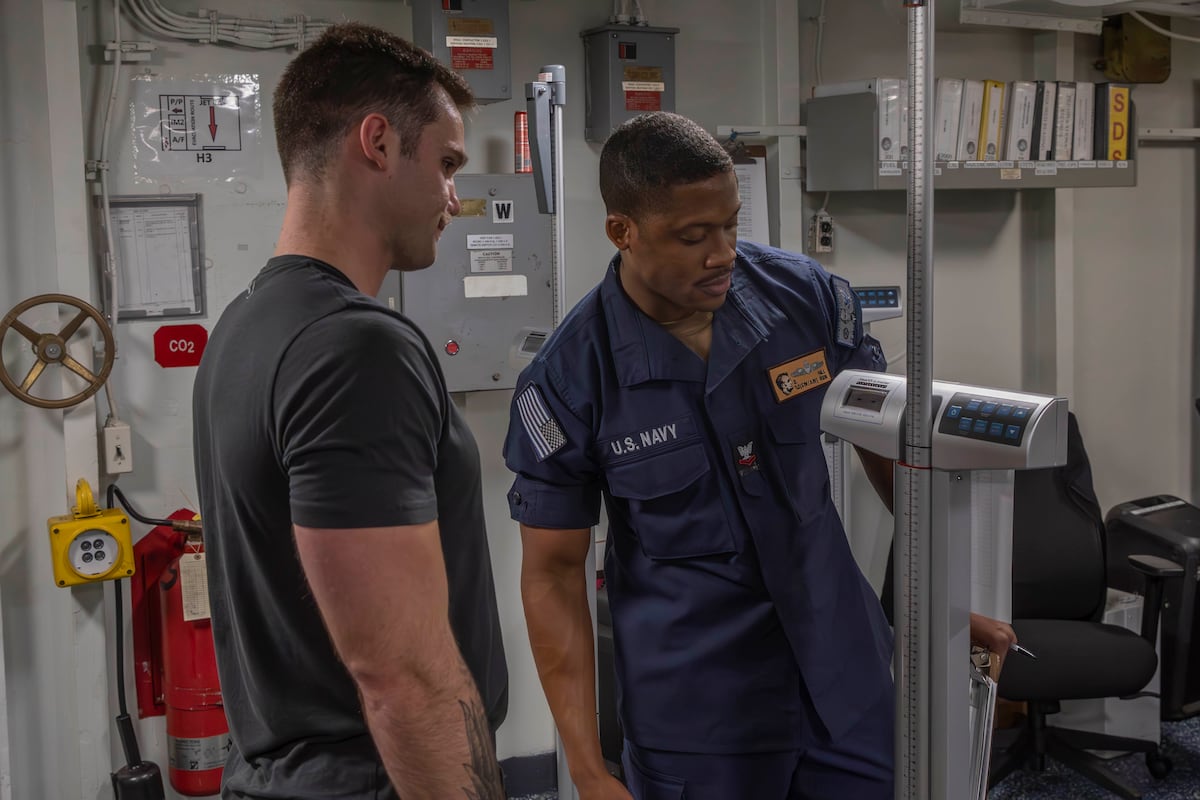Later this year, the Navy plans to publish results of a wide-ranging comparative test spanning two years and involving nearly 800 volunteers that may bring it — and perhaps the other services — closer to scientific consensus on the best way to measure body fat.
The default method of ensuring troops are within height and weight standards is the tape test — a simple and inexpensive way of measuring body fat circumference at key points and calculating body fat through a ratio equation.
But service members have long complained that the test can be inaccurate, as body builders and those with thinner necks tend to fare worse in these ratio-based calculations, and can sometimes improperly jeopardize military careers. Women, at least according to Marine Corps data, receive inaccurate body fat estimates far more often than men do.
Then there’s user error and inconsistency in how the test is administered. In presentations to a defense advisory committee in 2023, health and fitness officials from each of the services revealed that no two branches administer the test in the same way. Some, for example, measure the waist at the belly button, while others, including the Navy, locate the “iliac crest,” where the top of the hip bone juts out.
The Navy’s current assessment method involves multiple steps. Those who fall outside the maximum weight allowed for their height are first presented with a single-site abdominal circumference measurement, in which a proctor uses a tape measure to take a waist measurement directly above the iliac crest.
If sailors fail to fall within the maximum on this method, they are then offered a multi-site measurement. Female sailors are measured at the neck, natural waist and hips; while male sailors are measured at the neck and abdomen, according to a guidance document last updated in January 2023.
As of last November, there’s one more option to avoid testing out of regs: If sailors score at least an excellent-low rating on the physical fitness assessment, they are exempt from landing on the service’s Fitness Enhancement Program.
And while a failure to pass all these benchmarks will still land sailors on the FEP, requiring them to participate in additional activities to improve nutrition and fitness, getting separated from the service is off the table — at least for now.
The service stopped administratively separating sailors for fitness test failures in 2017, and officials have said they don’t plan to restart separations until the conclusion of its body composition analysis (BCA) study and any resulting changes to its fitness assessment program.
Navy officials have said little publicly about their two-year BCA methods study until now. But in a recent presentation to the Defense Advisory Committee on Women in the Services, officials with the Navy Culture and Force Resilience Office revealed in a presentation that the study evaluated three methods: Dual-energy X-ray Absorptiometry (DXA or DEXA); 3D Body Scanner; and Biolectrical Impedance Analysis (BIA).
The comparison, according to officials, evaluated the validity of each of these analysis methods in light of differences between the sexes “while taking into account other factors that can influence body composition,” such as race and ethnicity, age and post-partum status.
It also assessed whether body fat percentages derived from these different measurement methods were a good predictor of athletic performance, as seen in PRT scores, and general good health markers, like blood pressure and metabolism.
The last time the Navy conducted a comprehensive BCA study was 1999, according to Lt. Kathryn Cole, a service spokeswoman who provided a lengthy statement in response to Military Times queries.
Since then, “there have been knowledge and technology advances in body composition analysis, which take into consideration factors such as variations in bone mass that can differ across individuals and how that may affect calculations of body composition,” she said in the statement.
The study, which began with the establishment of a scientific protocol that was approved by an institutional review board, was conducted by Naval Health Research Center in San Diego, which solicited volunteers from the active-duty naval force to undergo comparative analysis.
In all, 757 sailors between the ages of 18 and 59 volunteered to participate, according to the statement, which reached the study’s sample size requirement.
All sailors received the standard tape test in addition to DEXA, 3D body scanner and BIA assessments. All the methods were then compared, according to the statement, using the DEXA measurement as a baseline “due to its accuracy and ability to measure tissue densities to calculate body composition.”
“The information gathered through this study will help determine how we measure body composition for the Fleet,” Cole said in the statement.
The DEXA assessment, which works by passing high and low X-ray energy beams through an individual while they lay supine, is indeed a gold standard for body fat measurement — and has a price tag to match. New scanners can cost up to $80,000, while individual DEXA scans, obtained commercially, can cost $300 apiece.
The extent to which cost plays a role in the Navy’s final policy-making has yet to be determined.
The Army, while staying with the tape test as a first line of assessment, has allowed soldiers to seek their commanders’ approval to get a follow-up scan via DEXA, InBody 770 (a BIA assessment method) or the Bod Pod, which uses air displacement to measure body composition.
While this allowance requires the ability of a soldier to travel to a military or government facility that already has one of these devices, the Army and Marine Corps have also opted to invest in hundreds of InBody 770 scanners, which retail at $21,000 each.
As of the end of 2024, according to Navy data, nearly 25,000 sailors — about 7% of the active-duty force — were on a weight management program, with the vast majority of program participants coming from the junior enlisted ranks.
Read the full article here








